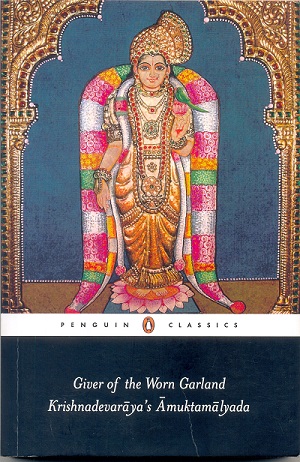Amuktamalyada is a poem written by Krishnadevaraya – the mighty king of Vijayanagara who I better know from the ruins of his kingdom at Hampi. The poem is about the well-known Tamil Alvar saint poetess Andal. She is considered an avatar of Bhu Devi, one of the consorts of Vishnu. Born in Srivilliputhur she travels with her father to Srirangam, post which a formal wedding of the two takes place.
 The poem was written in 16th CE by a Telugu king. About a poet-saint who probably lived in 7-8th CE in far Tamil land. Translated in 21st CE the poem still evokes the same emotion of Bhakti as it would have when the poetess was living. I have been wanting to read more about Andal for some time, without realizing I had this book in my library. As always, this was the time for me to read my first work on Andal. I wish I could read it in the original. At the very least I wish I could read in in Hindi. But most of her works are yet to be translated in Hindi.
The poem was written in 16th CE by a Telugu king. About a poet-saint who probably lived in 7-8th CE in far Tamil land. Translated in 21st CE the poem still evokes the same emotion of Bhakti as it would have when the poetess was living. I have been wanting to read more about Andal for some time, without realizing I had this book in my library. As always, this was the time for me to read my first work on Andal. I wish I could read it in the original. At the very least I wish I could read in in Hindi. But most of her works are yet to be translated in Hindi.
Buy Amuktamalyada by Krishnadevaraya on Amazon
Amuktamalyada begins with the description of the town of Srivilliputhur and Vishnuchitta – the father of Andal. Then there is an elaborate description of the city of Madurai where the king lives. The long description of its river, its palaces, and its women literally recreate the city in your eyes, probably with a lot of stretch of the imagination. You get acquainted with the flora, fauna, food, and fashion of the city of Madurai. Then comes the famous debate where the simpleton Vishnuchitta manages to defeat all the learned pandits of the city and take away the coveted prize making him a wealthy man.
Do read – Malavikagnimitram by Kalidasa – Srinivas Reddy
Wealth
His real wealth he finds next to a pond – a divine daughter whom he adopts and takes care of. As she grows, her love for Vishnu grows. It is something that the poet brings out by way of conversations between Goda, the real name of Andal, and her friends. There is ample description of the beauty of Goda and how she can only belong to Vishnu and no one else. The name of the poem comes from the fact that she used to offer Vishnu a worn garland.
Do read – The Devil Take Love by Sudhir Kakar
Then, there is a trip to Srirangam on the banks of Cauvery that the father-daughter duo makes. The father prays as a true devotee, the deity though is enchanted by his daughter and he plays his games. Eventually, he tells Vishnuchitta that he wants to marry his daughter, who cleverly asks him to visit his village for marriage. Who can refuse a future father-in-law? The wedding takes place and the Vishnu and Devi are united once again on this very earth.
Do read – Kabir by Hazari Prasad Dwivedi
Poetic Eloquence
Now, the story may seem simple, but its treatment and poetic eloquence are what make it exquisite. The translation to a large extent manages to capture the nuances of the incredible adjectives and cultural norms that are filled in the poem. There are elaborate descriptions to present the grandeur, the bhakti, the beauty, and the emotions.
The translator’s notes are as big as the poem itself. He explains the Telugu words, along with their Sanskrit names and the meaning in English for the reader. The notes make it very easy for the lay reader to understand the nuances. For an Indian reader, the words are not very difficult to understand, as some words are used in almost every Indian language. I seriously hope someone translated it in Hindi as well as other Indian languages.
Do read – Anand Math By Bankim Chandra Chattopadhyay
Translation
This is possibly the first poem I have read in translation. Must say it feels more than prose if you are used to reading ancient Indian texts.
I am happy I read Amuktamalyada. Now I am inclined to read the poetry of Andal, just have to find the right translation. So much of our literature in Indian languages need to be translated in other Indian languages. English will never be able to capture cultural nuances. While I find that most Indian languages are connected through these nuances even when words used are slightly different.
Do read – Born of the Soil by Kalindi Charan Panigrahi, Bikram Das
If the Bhakti poetry interests you, and if the story of Andal intrigues you, this book is probably your best bet.
Read it.








